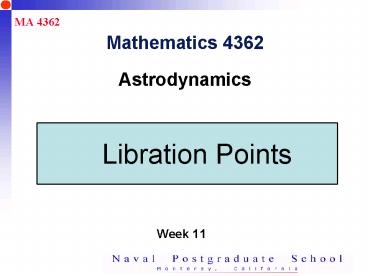Libration Points PowerPoint PPT Presentation
1 / 63
Title: Libration Points
1
Libration Points
2
What is a Libration Point
3
Balance of GravitationalPotential and Kinetic
Energy
Vis-Viva Equation Circular Orbit
4
Keplers Third law
5
Force Balance
Gravitational force
Centrifugal force
6
Miscellaneous Algebra
7
Solving for the Orbit Period
8
Third Law for LibrationPoint
Resembles the earlier "3rd law" equation,
except that the Earth's opposing pull is
now added.
9
Necessary Condition for Libration
10
Regrouping
11
Simplify by defining new variables
12
Libration Point Equation
Needs numerical Solution
13
Approximate Solution
Taylors series expansion
14
Approximate Solution (contd)
15
Approximate Solution (contd)
Taylors series expansion
16
Approximate Solution (contd)
17
Approximate Solution (contd)
Resolvent cubic
18
Approximate Solution (concluded)
Solve for Real Root
19
Numerical Example
20
Numerical Example (Contd)
L1 Libration Point
21
L2 Libration Point
22
L2 Libration Point (contd)
23
Miscellaneous Algebra
24
Necessary Condition for Libration
25
Regrouping
26
Simplify by defining new variables
27
Approximate Solution
Taylors series expansion
28
Approximate Solution (contd)
29
Approximate Solution (contd)
Taylors series expansion
30
Approximate Solution (contd)
31
Approximate Solution (contd)
Resolvent cubic
32
Approximate Solution (concluded)
Solve for Real Root
33
Numerical Example
34
L2- Libration Point
35
Other Libration Points
It turns out that three additional
station-keeping points of this sort also exist.
One of them, L3, is on the Earth-Sun line but
one the far side of the Sun, at about the same
distance as the Earth. It has no practical
use, because at that position, a
calculation involving just the Earth and the Sun
is a very poor approximation. The pull of
other planets can exceed that of the Earth and
cannot be ignored.
36
Other Libration Points
The other two Lagrangian points, L4 and L5, are
on the Earth's orbit, with the lines linking
them to the Sun making 60 angles with the
Earth-Sun line. At those locations the
two-body calculation based on the Earth and the
Sun also predicts station-keeping t hat is,
equilibrium in a frame of reference rotating with
the Earth). Again, however, L4 and L5 are so
distant that for a realistic calculation of the
motion of a spacecraft near them, the pull of
other planets must be included.
37
Other Libration Points
38
Earth-Moon Libration Points
However, the Earth-Moon system also has its L4
and L5 points, and these have received some
attention as possible sites for observatories
and for self contained "space colonies. They
have an important property that they are stable.
In contrast, equilibrium at the L1 and L2 points
is unstable, like that of a marble perched atop
a bowling ball. If positioned exactly on the
top, the marble will stay in place, but the
slightest push will make it move further and
still further from equilibrium, until it falls
off.
39
Earth-Moon Libration Points
By contrast, the equilibrium at L4 or L5 are
like that of a marble at the bottom of a
spherical bowl given a slight push, it rolls
back again. Thus the spacecraft at L4 or L5
do not tend to wander off, unlike those at L1
and L2 which require small onboard rockets to
nudge them back into place from time to time.
40
Stability of Libration Points
Stability analysis is beyond what I want to Visit
here For detailed stability analysis see PDF
file at Neil J. Cornish Lagrange Points
http//web.nps.navy.mil/ssweb/MA4362/week11/lagr
ange.pdf
41
Stability of the Libration Points(Heuristic
explanation)
Contour plot highs colored yellow lows
colored purple. L1 and L1 are at
hilltops Satellite at L1 or L2 Picks up
speed when it rolls of the hill Coriolis
force comes into play and sends the satellite
into a stable orbit around L1 or L2
Contour plot of the effective potential
42
Stability of the Libration Points(Heuristic
explanation)
L4 and L5 are at Valley Points That is
if the orbit is Perturbed satellite wants to
return to original orbit Station keeping
costs are minimal here
Contour plot of the effective potential
43
Actual Orbital Examples
The L1 point of the Earth-Sun system affords
an uninterrupted view of the sun and is
currently home to the Solar and Heliospheric
Observatory Satellite SOHO. The L2 point of
the Earth-Sun system is proposed for the location
of the Next Generation Space Telescope because it
will always be eclipsed from the sun. The L1
and L2 points are unstable on a time scale of
approximately 23 days, which requires satellites
parked at these positions to undergo regular
course and attitude corrections.
44
SOHO L1 Orbit
45
L4, L5 Points Earth / Moon System Center of Mass
46
Now Add Spacecraft to Picture
47
Angular Velocities
48
Forces Acting on Moon
49
Rearranging gives
50
Force Balance on Spacecraft
51
Force Balance on Spacecraft
52
Collected Equations
53
Eliminate Moon Velocity
54
Rearrange
55
Eliminate Spacecraft Velocity
56
Rearranging
57
Collected Equations
Necessary Conditions for Libration Point
58
Law of Sines
59
Rearranging
60
Collecting terms
61
Substituting in
But we already proved that
Implies b c a d a b
Equilateral triangle
62
L4, L5 Libration Points
63
Postscript 3-Body Problem
FYI, the "three body problem" is the solution
of the motion of three bodies under their mutual
attraction. General three-body motion has
chaotic properties. Even the general "restricted
three body problem" where one of the bodies is
very small--e.g. Earth, Moon and spacecraft--is
analytically insoluble, although specific
solutions exist, like the ones in which the
spacecraft is positioned at one of the Lagrangian
points.

